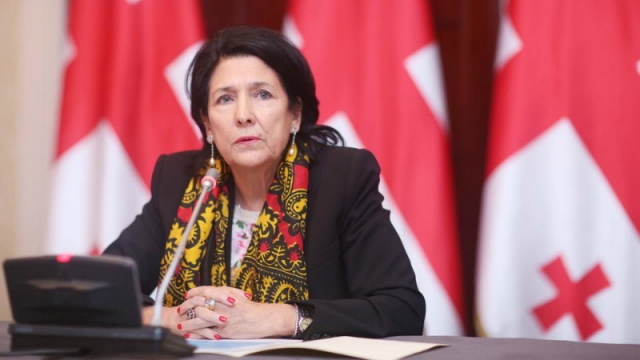President Addresses WHO, UN, CoE on Seizure of Georgian Meds in S. Ossetia
The President of Georgia, Salome Zurabishvili, has sent letters to the Director-General of the World Health Organization, the UN High Commissioner for Human Rights and the Council of Europe Commissioner for Human Rights in connection with the seizure of Georgia-produced edication in Russian-occupied Tskhinvali region, the President's administration reports.
In the letters, the President of Georgia also notes that in addition to the seizure, the crossing point to Akhalgori, a town in so-called South Ossetia, is closed, which has directly led to a humanitarian crisis on the ground.
Due to this situation, the population living in the occupied territories and especially pensioners, those suffering from chronic diseases and in need of permanent medical treatment, are in difficult conditions.
The President points out that by blocking the crossing point and banning the use of Georgia-produced medicines, fundamental human rights, such as the right to health, the right to life and the right to freedom of movement, are restricted.
The President called on the commissioners to respond to the situation in the occupied territories of Georgia and the closing of the crossing point within their capabilities and competence.
Medicines with annotation in the Georgian language have been banned from two pharmacies in the Russian-occupied Tskhinvali (South Ossetia). The seized medicines include Voltaren, Flu Cold, Crestor, Hemoral, Tolarin Plus, and more- Russian media reports.
This is not the sole case of pharmacies undergoing inspections and confiscations of Georgia-made products in the Russian-occupied territory. The sale of Georgia-produced medicine (along with other products) has been prohibited in Tskhinvali, conforming to a resolution adopted by the region’s de-facto Ministry of Internal Affairs in 2006. The resolution likewise forbids the import and sale of meat, alcohol, non-alcoholic beverages, mineral water and other produce from Georgia.
In response to the above-mentioned, State Minister for Reconciliation and Civic Equality of Georgia, Ketevan Tsikhelashvili, said this is “a deliberate policy” of Russia-controlled Tskhinvali aimed to “cut ties and contacts with the rest of Georgia, at any price.”
By Ana Dumbadze
Related Story: Tskhinvali Seizes Georgia-Produced Medication












